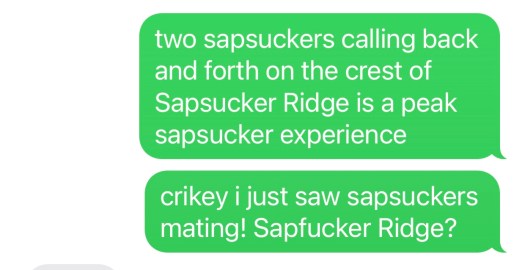Dear April the headline in the local paper reads WINTER SPRINGS A SURPRISE and i wonder whether there’s a course they all take in journalism school, Bad Puns 101
we got a LOT of snow. Mom measured nine inches at one spot in the field. but as wet as it was and as quickly as it began to subside it was hard to tell
last night it occurred to me that after i lost my pot belly and before i got bifocals there was like a six month period when i actually had a clear view of my junk while taking a leak
thank you for coming to my Netflix comedy special
this morning for some reason i was remembering how i used to advertise poetry readings in the late 80s and early 90s by putting flyers in unexpected places all around Penn State’s main campus, and how a grad student in mathematics once showed up out of sheer curiosity — “I’d never heard of such a thing!”
people from the sciences generally seemed like a more attentive audience than the literature people for some reason
back when blogging was still new and exciting, for a few years poetry bloggers like me regularly attracted such non-traditional audiences as well. but relatively few poets took advantage of that. most assume that the only people who want to read poetry are other poets and act accordingly. i remember how surprised i was the first time i heard someone refer to other poets as her tribe. i dunno, i’ve just never felt that way. i used to belong to a pretty convivial group of bloggers all of whom liked poetry i think but most were more readers than writers of it. it was only after that group went quiet that i started the poetry blog digest. i had resisted turning Via Negativa into just a poetry blog for years, but in the end i felt that if i didn’t specialize i wouldn’t be able to retain even the small audience the site had
this April Diary exercise feels like a throwback to those early years of writing whatever pops into my head. and it may well be the sort of blogging i’ll go back to when i’m done with Pepys
losing weight and getting in better shape has had a few unexpected consequences. my favorite is that i am much better at balancing on one foot. i revel in that every morning when i put on my socks
a snowflake insinuating itself under my umbrella lands on the page of my open book: that brief moment before its star vanishes into a wet spot
snow squall erasing my own tracks as i sit watching
now i know how Pepys’ Diary feels
walking back along the ridgetop i’m impressed by the way the storm plastered snow on both sides of tree trunks giving them a distinctly calligraphic appearance

the world feels really precarious these days. global weirding is in full effect and i wonder just how bad and widespread famine will become as more and more crops fail around the world on top of the situation with grain exports from Russia and Ukraine
meanwhile the drumbeat for direct military action against Russia grows deafening as Taibbi’s latest essay on Substack makes clear. anyone attempting to challenge the dominant narrative gets shut out of mainstream commentary altogether, even more thoroughly than in the run-up to our invasion of Iraq in 2003. for the first time since the fall of the Berlin Wall nuclear annihilation seems like a real possibility
it’s essential for any working poet to understand how propaganda works, how dominant narratives are crafted and how they become dominant, in part by ridiculing or simply ignoring or deplatforming anyone who challenges them
the invisibility of dissidents in this society parallels the invisibility of poets and i would argue both derive from a common source: our very but not exclusively American intolerance of any nuance plus a general discomfort with hard truths e.g. about death and suffering
finished Cicada. here’s a stanza i liked:
Our dream gathered
Phoebe Giannisi translated by Brian Sneeden
and spit us out polished
in the night
without tears
without the depth of touch
the morning couldn’t find space
to bring its light
across to the other side
on the riverbank stones
one by one
open their eyes





